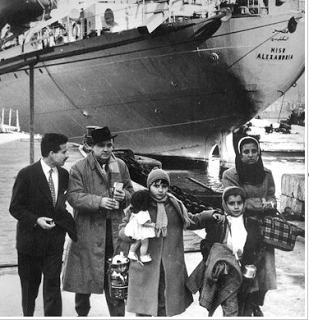
Last November was the 60th anniversary of the exodus of 25,000 Jews from Egypt. Lyn Julius examines what happened in Fathom (Autumn 2017):
Jews leaving Port Said (Photo: Jewish Agency)
A quarter of the Jews were Egyptian. As a result of an increasingly restrictive nationality policy privileging ‘real Egyptians’, 40 per cent were stateless. To possess a British or French passport did not require the holder to have lived in Britain or France or even to speak the language (of 24,000 British subjects in Egypt, only 45 per cent were from Britain itself and a quarter were Maltese. Of 21,270 French, only 40 per cent were from France; 33 per cent were from the Maghreb.)[1]
In 1948, the repercussions from the establishment of Israel reverberated in the Cairo Hara or Jewish quarter: over two hundred Jews were killed in a bombing campaign between June and November. A first wave of 20,000 Jews fled, mostly to Israel.
The troubles had largely left Egypt’s substantial Jewish bourgeoisie untouched. Prominent in banking, finance, retail, land development, transport, commerce and industry, they continued living comfortable lives, frequenting clubs and cafés, and spending their summers by the sea.
In 1952, King Farouk was deposed in a military coup and sent into exile. For the Jews, General Neguib’s meeting with Chief Rabbi Nahum Effendi promised a new dawn. But Colonel Nasser, Neguib’s successor, was to use the Sinai campaign as a pretext for expelling almost 25,000 Jews and confiscating their property.
Expulsion begins
Invoking emergency laws, Nasser set about expelling British and French subjects. Jews were expelled in two waves: the first (accounting for some 500 Jews) [2] were given 24 hours to leave. The second was ordered to leave the country within two to seven days with their families.[3] Clemy Lazarus, née Menir, was five years old:
Clemy’s father, being an Egyptian national, was not expelled and remained behind. Clemy’s mother was sent with her children to refugee camps in Leeds and Kidderminster:
Back in Egypt, It became clear that in the initial confusion the authorities themselves were torn between expulsion and detention:
By the end of November, the expulsion orders were extended to stateless Jews, as well as those of Egyptian nationality.
George Naldrett-Jays, a retired senior British police commander in Alexandria, fulminated at the injustice:
Some 900 more Jews were arrested by 7 November 1956.[5] They were sent to prisons and detention camps. Of the 500 interned in the Jewish school at Abbasiya, Cairo, half were stateless. Old women, half of them stateless, were among the 42 Jews detained at the Jewish Abraham Btesh school in Cairo. Of the 300 kept at Les Barrages prison, Cairo, half were stateless, the other half were UK and France subjects.

Leave a Reply